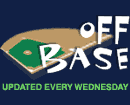|
|
|
|
 |
| ||
|
Scores Schedules Standings Statistics Transactions Injuries: AL | NL Players Offseason moves Free Agents Message Board Minor Leagues MLB Stat Search MLB en espaņol Clubhouses | ||
| Sport Sections | ||
|
| ||
| Wednesday, December 20 | |||||
| 'Win and field' is a Hall of Fame lock Special to ESPN.com | |||||
There are 17 new players eligible for the Hall of Fame this year, ranging
from a 6-foot-6 outfielder with 3,000 hits to a 6-5 pitcher with a losing
record. In other words, it's a very interesting group.
3,110 hits, 465 HR, 1,833 RBI Looking back on it, Winfield seemed fated for Cooperstown. Not only was he born the day Bobby Thomson homered off Ralph Branca (Oct. 3, 1951), but he also once said that he had the "perfect baseball name, too. Win and field." One of the greatest athletes of the century, Winfield was drafted by four leagues (major league baseball, the NFL, NBA and ABA -- he never played hockey). A complete player (he pitched in the College World Series), Winfield stood so tall at the plate with so powerful a swing that Paul Molitor once said he was the one player who made him physically afraid to play third base. To say nothing of the seagulls that foolishly flew in the path of Winny's powerful right arm. With more than 3,000 hits and 450 home runs, the only question surrounding his selection is which of the six caps he wore during his 22-year career to put on his Hall of Fame plaque. Of course, even if his statistics weren't so convincing, he still would deserve a special place in Cooperstown after playing the first 17 years of his career for Ray Kroc and George Steinbrenner. Kirby Puckett .318, 2,304 hits, 1,085 RBI There is a lot of talk about what Puckett might have accomplished had glaucoma not ended his career in 1996, just as baseballs really began flying out of ballparks. Players don't get into Cooperstown based on what if scenarios, however, and we can only judge Puckett on what he accomplished before his forced retirement. And when you restrict the question to that ... he still is an overwhelming choice. The funny looking guy with the bald head and wide rear had four hits in his first big league game and he never slowed down until hit by a pitch in his final plate appearance. While other players had better occasional seasons from 1986-1995, Puckett was consistently the best player in the game over that period. No player was more liked or respected by his peers, and few were more popular with fans. He not only made his teammates better -- he led the Twins to two World Series championships, an accomplishment that seems more staggering with each passing year -- he made them happier. The game still isn't as fun a place with him off the field. Questioning Puck at Cooperstown's front door would be like St. Peter asking for Mother Teresa's credentials. Don Mattingly .307, 2,153 hits, 1,099 RBI People reading Scott Boras' thesis on Alex Rodriguez and his career projections, would be wise to consider Mattingly. Like Rodriguez, he seemed a lock for the Hall of Fame after his first six seasons. Like Rodriguez, he hit for power and average and was also his position's best fielder. And then a back injury turned him into just an average player the second half of his career, leaving him about a pinstripe shy of Cooperstown credentials. I'm not suggesting the same will happen to Rodriguez but Mattingly is proof that long-range career projections are about as accurate as Rick Ankiel's fastball in the postseason. Dave Stewart 168-129, 3.95 ERA He had four great seasons from 1987-90 when he was baseball's top big-game pitcher and produced more Ocober prime-time gems than David E. Kelley. But there were a lot of mediocre seasons surrounding that success and his career record just isn't Hall of Fame caliber. Lou Whitaker 1,386 runs, 1,084 RBI He was a very good second baseman but he only belongs in the Hall if he and Alan Trammell can go in as a joint entry in a special "great duos" wing for such combos as Reggie Jackson and his ego. John Kruk and Andy Van Slyke. No, but they would give some great acceptance speeches, wouldn't they? Steve Bedrosian, Tom Browning, Ron Darling, Jim Deshaies, Kirk Gibson, Tom Henke, Howard Johnson, Lance Parrish, Dave Righetti, Jose Rijo. See you in Cooperstown guys. Just be sure to buy your tickets, same as everyone else. Jim Caple's "Off Base" column appears each Wednesday on ESPN.com. | ALSO SEE Rogers: On any stage, Puckett is a hero AUDIO/VIDEO  Jack O'Connell, President of the Baseball Writers, reviews his Hall of Fame ballot. Jack O'Connell, President of the Baseball Writers, reviews his Hall of Fame ballot.wav: 3139 k RealAudio: 14.4 | 28.8 | 56.6 | ||||
